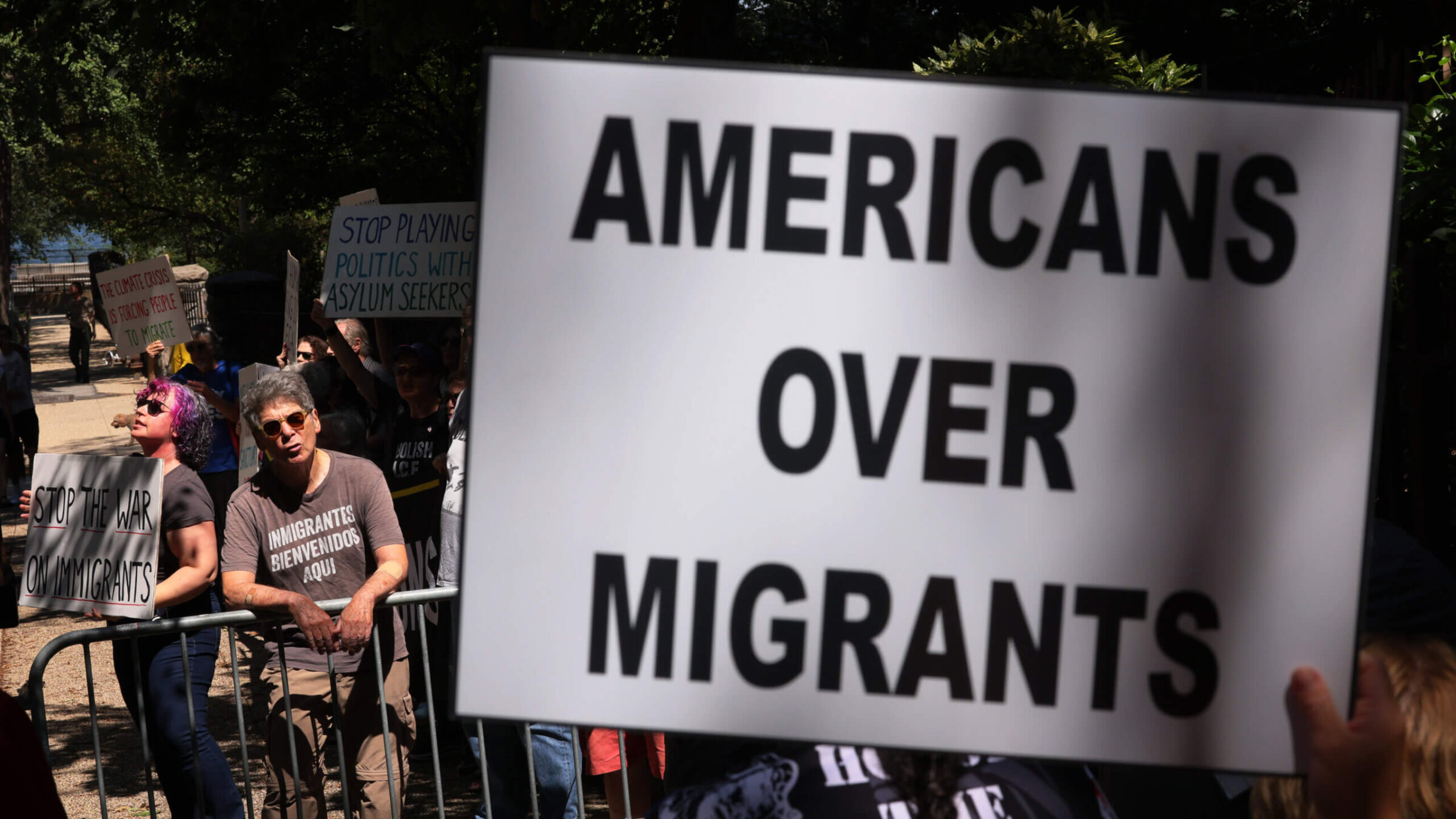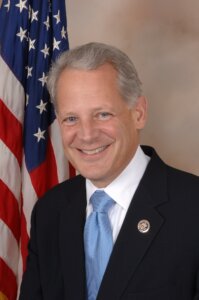As Yom Kippur approaches, the legacy of America’s treatment of Jewish refugees must be a call to action
Increasing numbers of migrants are pouring into American cities. They need our help.

Counter protestors hold up signs as people participate in an anti-migrant rally and protest outside of Gracie Mansion on August 27, 2023 in New York City. Photo by Michael M. Santiago/Getty Images
For Jews, the 10 days between Rosh Hashanah and Yom Kippur are known as the Yamim Noraim, or “Days of Awe,” a period of solemn introspection. It is a conflicted time — a spiritual divergence between optimism for a new year, and atoning for the sins of the past year. This year, our days of awe coincide with news of increasing numbers of migrants desperately trying to enter the United States to escape difficult conditions in their homelands.
The migrant crisis is a complex problem, and provokes powerful reactions across the political spectrum. Even leaders of “sanctuary cities” are struggling to grapple with the care of thousands of new residents. New York mayor Eric Adams worried aloud during a town hall earlier this month that the influx of desperate people pouring into the Big Apple “will destroy New York City.”
As we reflect on the sins of the past and look toward the future, we should take this time to acknowledge another time the United States faced such an influx of migrants — Jewish migrants — and turned them away.
A desperate need for safety
Eighty-five years ago, in November 1938, the Nazis unleashed Kristallnacht across Germany. Synagogues were burned to the ground, Jewish businesses destroyed, Jews themselves beaten, some murdered.
Shortly after the riots, President Franklin Roosevelt was asked at a press conference if he’d support modifying immigration laws to permit the entry of German refugees to the United States. He said he would not. The next day, 36 of the most prominent writers in America, including John Steinbeck and Dorothy Thompson, sent Roosevelt a telegram: “God help us if we have grown so indifferent to human suffering that we cannot rise now in protest against pogroms in Nazi Germany.”
Two unlikely congressional allies from opposite ends of the political spectrum — liberal Democratic Senator Robert Wagner from New York, and conservative Republican Edith Nourse Rogers from Massachusetts — drafted legislation to increase quotas on immigrants from Germany. They knew public opinion was against them. One week before the bill was formally introduced in February 1939, a Gallup poll found that 67% of Americans opposed permitting 10,000 refugee children into the country.
To address the concerns of labor unions about immigrants taking jobs, the bill was narrowed to accept only children under the age of 14. To mollify those who feared a swarm of refugees, the language imposed a ceiling of 20,000 children over a two-year period. Each child would have to prove they had family in the U.S. who would care for them so that they would not become charges of the state. To minimize antisemitic backlash, the word “Jewish” was excluded from the bill.
The bill was introduced on Feb. 9, 1939. Early endorsements came from the American Federation of Labor, the Federal Council of Churches and the YMCA. Celebrities like Henry Fonda, Helen Hayes and Don Ameche voiced their support for it. Former Republican presidential candidate Alf Landon and his running mate Frank Knox praised the bill. So did Republican New York City mayor Fiorello LaGuardia. In Northampton, Massachusetts, former first lady Grace Coolidge announced that she and her neighbors would personally care for 25 of the refugee children. 85 newspapers from 30 different states endorsed the bill.
On Feb. 14, first lady Eleanor Roosevelt urged the passage of Wagner-Rogers in a press conference. A week later, she telegrammed FDR while vacationed aboard the USS Houston: “Are you willing I should talk to [Undersecretary of State] Sumner [Welles] and say we approve passage of Child Refugee Bill. Hope you are having grand time. Much love. Eleanor.” But FDR remained silent.
He wasn’t alone. An informal poll of U.S. senators by the Non-Sectarian Committee for German Refugee Children found only 45 willing to even state a position on the proposed legislation: 24 opposed and 21 supported the measure. The rest said the issue was “too hot to handle.”
Supporters of the bill were unfazed. They believed that the moral argument would win the day once Americans understood it. They assumed the most vociferous voices represented a fringe element. And besides, they had the votes where they counted: in the congressional committees that would decide the legislation’s fate.
‘America First’
In April 1939, three days of hearings were held on the bill. Public testimony was nearly unanimous in support. Even former President Herbert Hoover, whose administration restricted immigration, sent an endorsement. Americans who couldn’t make it to the Hill to testify in person flooded Congress with supportive letters and proclamations, resolutions, declarations passed by associations, councils, committees and organizations — all dutifully entered into the official record.
Things began to turn for the worse. On Saturday, April 22, Francis Kinnicutt of Fair Hills, New Jersey, President of the Allied Patriotic Society, which included societies like the Sons of the Revolution and Daughters of the Revolution, testified: “If the bill were enacted into law, the additional immigration permitted by it would be for the most part of the Jewish race.”
Kinnicutt presented arguments with a familiar ring today. If children were permitted into America, “there will undoubtedly be considerable agitation for a change in the law to admit the parents of these children.”
The following Monday, the subcommittees convened for their final hearing, during which a torrent of strident opposition to Wagner-Rogers poured forth.
“I feel like we should be taking care of our own first,” said the first witness, J.L. Wilmer, representing the Junior Order of United American Mechanics.
Herman Miller, National Secretary of Patriotic Order, Sons of America, proclaimed: “I am for America first, last and forever. America first.”
Inserted into the record was a letter from J.E. Nieman of the Regular Veterans Association:
“The bringing of foreigners into the United States is a direct attack against our national defense program. America doesn’t need the foreigners. We have no room for them and their progeny. We have our own disabled, our own homeless, our own sick and hungry, our own uneducated, our own slums and sharecroppers, our own problems, chief of which is to keep America for Americans.”
Despite this fiery opposition, the joint subcommittees voted unanimously to advance Wagner-Rogers to their respective full committees. But the victory seemed tenuous.
Much like today, the immigration debate dominated headlines. At a Washington, D.C., cocktail party shortly after the hearings concluded, Laura Delano Houghteling, wife of the Commissioner of Immigration, remarked that the problem with Wagner-Rogers was “that 20,000 children would all too soon grow up into 20,000 ugly adults.”
On June 2, 1939, New York Congresswoman Carolyn O’Day tried eliciting FDR’s position on the bill. A White House aide sent the president a memo requesting guidance. The scribbled response: “File. No Action. FDR.”
It all came together — or fell apart, depending on your perspective — in a feat that only the United States Congress could pull off: having it both ways. On June 30, the full Senate Immigration Committee passed Wagner-Rogers, but with a catch: 20,000 children would be granted visas, but only as part of the existing quota of 25,000.
There would be no overall increase in the number of Jewish migrants accepted to the country. For good measure, the committee also passed measures by Senator Robert R. Reynolds of North Carolina to suspend all immigration for five years and require fingerprinting of all “aliens.”
Wagner objected vehemently: “The proposed change would in effect convert the measure from a humane proposal to help children who are in acute distress to a proposal with needlessly cruel consequences for adults in Germany who are in need of succor and are fortunate to obtain visas under the present drastic quota restrictions.”
He was so incensed by the changes that he was forced to oppose his own bill.
From 5699 to 5784
The sins of the past reach toward us in the Yamim Noraim of 5784 like a shadow, and that shadow is accompanied by disturbing echoes in our present. A major political party in the United States demonizes migrants at every turn, using precisely the same “America First” rhetoric used to deny Jewish refugees entry to our nation as the Holocaust unfolded in Germany.
Meanwhile, the other party is all too often drawn into this game of nativist grandstanding, failing to explain to the American people the importance of welcoming migrants to our country, to pose the question: Who among us has not been unwelcome in America at some point in our histories?
I fear the next election in 2024 will make matters worse. Bigotry and demagogy will fan fear and secure votes. Careful, bipartisan solutions will be attacked, marginalized, and pulled inside out, meeting the same fate as Wagner-Rogers. Instead of solving the crisis, the radical extremes in Congress will seek to perpetuate it.
As we look toward this new year, let us remember the sin of our nation’s past in its failure to welcome Jewish migrants in desperate need of safe refuge. The American Jewish community must use this history as a powerful call to action, a chance for teshuvah to confront the sins of our present, and fight for an America that welcomes all.
To contact the author, email [email protected].
























